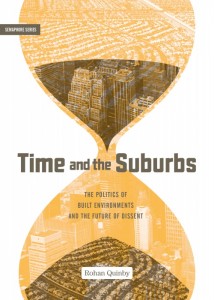Time and the Suburbs: The Politics of Built Environments and the Future of Dissent (Arbeiter Ring Publishing) is a commanding political reassessment of the urbanization of rural cities post-industrialization.
The 150-page discourse by Rohan Quinby explores fatalism in the capitalistic movements that encode and dictate the constructs of human civilizations. Using political and philosophical theories of time and the effects of capitalism on human stigma, the book explains the reasoning behind the rise and fall of urbanization away from traditional world economic hubs, such as New York, London, and Paris.
Addressing the tangible of physical space and constructed infrastructure, and the intangible of time and societies norms and values, the book analyzes what Quinby calls the “capitalist capture,” which he writes has converted millions of producers into consumers.
Time and the Suburbs is a cyclical questioning of how the horizontal dispersion of wealth, commonly known as the middle class, generated by the invisible hand of capitalism, led to a dissent in rural urbanization.
The fault in the book is that it is extremely over-wordy, but, to his credit, Quinby was faced with no small task: Time and the Suburbs compartmentalizes the thoughts of a modern economic class debate into a radical reenactment of the business cycle over the past 80 years. Enlightening and at times threatening to the justness of a capitalist society, the book endorses the realistic sanctions that impede upon economic growth as defined by the consumerism model.
While it’s not your typical bathroom reader because of its slow build to a grand result, the book can be coercively intoxicating about the probable reasoning of consumerism in this modern day.

